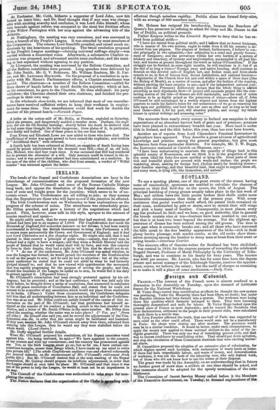SCOTLAND.
To use a sporting phrase, one of the great events of the season having come off successfully, sportsmen are enabled to calculate the chances of success on their first field-day on the moors, the 12th of August. The principal hatching of young grouse usually takes place in the last week of May; and seldom have the little poults broken their shells under more favourable circumstances than those of the present year. With every assistance that genial weather could afford, the parent birds remained on their nests, undisturbed by gale or storm, save to stretch their still wings and pick a hasty meal of heather. Consequently, in most places, every egg has produced its bird; and we hear, on good authority, that in general the broods contain nine or ten—fourteen have been counted in one covy, but that is at least two brace beyond the average. Not the slightest ap- pearance of disease has been noticed among the old grouse. The time is now past when it commonly breaks out ; and all those who have traversed the hills speak to the fine healthy appearance of the birds—rich in their glossy brown plumage, with scarlet combs, as the old cocks show them- selves strutting among the heather to decoy man or beast from their nests or young broods.—Invernesa Courier.
The sinecure office of Gazette-writer for Scotland has been abolished. It was created in 1810, for the express purpose of rewarding the celebrated Dugald Stewart, Professor of Moral Philosophy in the University of Edin- burgh, and was to continue in his family for forty years. The income was 600/. per annum. Mr. Lawrie, who has for some time been the depute printer and actual manager of the Edinburgh Gazette, receives the appoint. meat, minus, we believe, the salary; but the tariff of charges so remaining as to make it still a place of some emolument—Daily News.


























 Previous page
Previous page